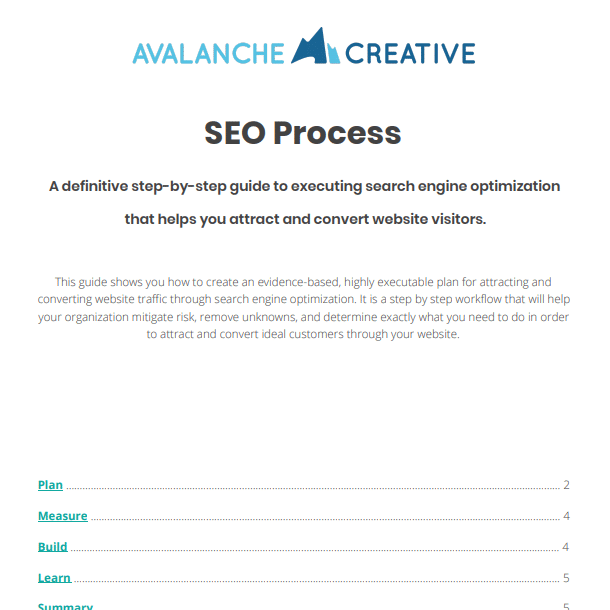How to Measure Success in Your SEO Campaign: A Guide
Category: Digital Marketing | Tags:
SEO is a long-term strategy that can provide benefits for years to come, but it can take several months to start showing significant results. Those results may also look different depending on your priorities. Just as every business is unique, every SEO campaign should be unique as well. Taking a tailored approach will be far more efficient and result in better leads and revenue for your business.
What Are Key Performance Indicators for SEO?
A key performance indicator (KPI) is a piece of information chosen to demonstrate the level of success your strategy has achieved. They are typically chosen based on your overall business goals. SEO key performance indicators can include specific methods of contact, such as form leads on your website, phone calls, or emails. They may also be selected to highlight the performance of specific products or services that are key to your business’s success.
Important KPIs for SEO
Revenue
One of the most important metrics for your business will always be revenue. Including revenue as a KPI will demonstrate your return on investment and the ultimate impact that SEO will have on your business. If your SEO strategy has been designed around the goals of your business, you should start seeing an impact. This can be demonstrated more closely by breaking down revenue from specific products or services that your SEO content is targeting.
Organic Traffic as a KPI
Organic traffic is one of the most important SEO KPIs to track. It shows how many people are visiting your website from Google’s search engine results page (SERP). Organic traffic does not include visits to your website that came through paid sources, such as Google Ads. Because of that, organic traffic is a great way to measure the direct success of search engine optimization.
However, organic traffic should not be your only KPI to monitor SEO results. For instance, some SEO campaigns may lead to a decrease in organic traffic but an increase in leads. That’s because the SEO campaign has shifted the organic traffic to a more relevant audience. That audience may be smaller, but it’s more profitable since a higher percentage of visitors are ultimately engaging with your business.
Keyword Rankings
A keyword is the search term that a person types into Google, and the ranking is where it appears on the SERP. Many companies choose the keywords that they believe are most relevant to their important products and services and focus on creating and optimizing pages that will rank highly for those keywords.
Click-Through Rate (CTR)
A click-through rate is an SEO KPI that compares the number of visitors who saw a link, known as impressions, to the number that actually clicked on it. Click-through rates are popular measurements in paid ads on Google, as well as social media and email campaigns. In SEO, these can be used to show how visitors are moving through the website and ending up on key pages. You may have a blog post that pulls in a lot of organic traffic, but the CTR will show if those visitors are moving from the blog to a product or contact page.
Conversion Rate
The conversion rate shows how many people ultimately took a desired action, such as completing a form lead, purchasing a product, sending an email, or subscribing to a newsletter. It’s an important SEO metric because it shows the success of your overall strategy and how it directly impacts your overall business goals.
Technical SEO KPIs
Bounce Rate
If you’ve ever visited a website, decided you didn’t like what you saw, and hit the back button or closed the window—you bounced. A high bounce rate is often an indicator that your content is either irrelevant to the visitor or that there are technical issues with your website. Perhaps certain elements failed to load correctly, or the presentation is unattractive or outdated. Many people will leave websites that look unprofessional or are filled with too many ads.
Page Load Speed
An important factor in maintaining a low bounce rate is ensuring that your website loads quickly. People aren’t willing to wait around for more than a few seconds for your website to load. The longer it takes, the more likely people are to leave your site before they even see what it has to offer.
Number of Backlinks
A link that appears on another website that sends people to your site is called a backlink, and search engines like Google place a lot of value in them. A backlink is evidence that another person has seen your content and has found it valuable enough to direct their own visitors towards it. Creating useful content that bloggers, writers, and reporters will want to link to will lend legitimacy to your site and boost your place on the SERP.
On-Page SEO KPIs
Domain Authority
The Domain Authority is a compound score created to predict a site’s ability to have its pages rank highly on the SERP. The higher a site’s score (out of 100), the easier it will be to have pages rank well. It is decided by a combination of factors such as total links and linking root domains. The Domain Authority score was created by Moz, but other SEO companies have their own version, such as SEMrush’s Authority Score.
Time Spent on Page
This SEO KPI is pretty straightforward. One of the metrics Google uses to determine the value of your page is how long visitors tend to stay on it. If people tend to spend several minutes reading an entire blog post, it is likely more useful and relevant than if they only spend 30 seconds.
How to Monitor SEO Results
There are a lot of tools available to help you monitor your SEO results, such as Google Analytics, SEMrush, and the backend tools on your website. One of the best ways to monitor your SEO results is to work with an experienced team of SEO experts who can dig into the numbers and formulate the best strategies for your business. SEO isn’t one-size-fits-all, that’s why it’s important to work with an SEO company that will craft KPIs and strategies that are tailored to each company’s overall business goal.
Get Better SEO Results for Your Campaign
Want to learn more about how to measure SEO results? Reach out to our team! Avalanche Creative offers SEO consulting, auditing, content writing, and other services. We’ll be happy to talk with your team to see if Avalanche is right for you.
Share this article:
The Avalanche Email: Fun. Simple. Educational. No Selling.
Learn Result-focused SEO & Content
Join over 2,272+ others who get one email every Wednesday with simple instructions on how to get more website traffic and leads through SEO and content marketing. (Learn more about the email)
Keep Learning
How To Show Up in Gemini (And Win More Local Jobs)
Show up in Gemini when homeowners search for landscaping services. Build the right signals on Google and your website to win more qualified local jobs.
How to Run Google Ads for Landscapers: A Complete Guide
Learn how to set up Google Ads for landscapers, attract qualified leads, and win more local jobs with this step-by-step guide.
🏔️ Watering > Planting New Seeds
Your next marketing win may already be on your site. Learn how to optimize existing pages for better rankings, traffic, and results.
The Recipe vs. The Meal
Your customers buy the experience, not the product. Discover a simple way to shift your message from ingredients to the full meal.
🏔️ Hook, Line, and Sinker 🎣
Use this fishing framework to turn your posts into stories that capture attention, create tension, and inspire action from your audience.
🏔️ Avoid Everything That Doesn’t Move You Forward
Stop chasing shiny tools and refocus on what moves your marketing toward the end zone. Simple steps to cut noise and make steady progress.




